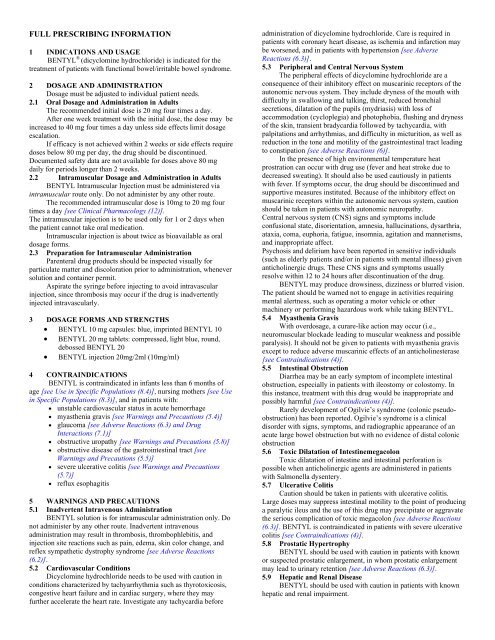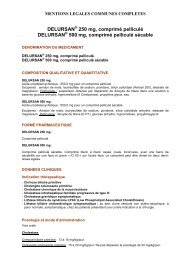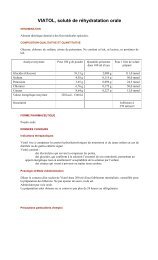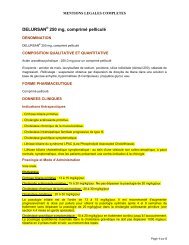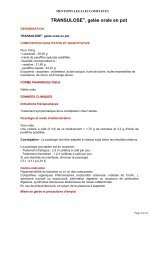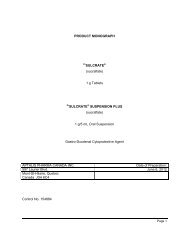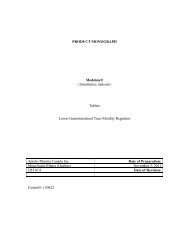bentyl - Aptalis
bentyl - Aptalis
bentyl - Aptalis
Create successful ePaper yourself
Turn your PDF publications into a flip-book with our unique Google optimized e-Paper software.
FULL PRESCRIBING INFORMATION<br />
1 INDICATIONS AND USAGE<br />
BENTYL ® (dicyclomine hydrochloride) is indicated for the<br />
treatment of patients with functional bowel/irritable bowel syndrome.<br />
2 DOSAGE AND ADMINISTRATION<br />
Dosage must be adjusted to individual patient needs.<br />
2.1 Oral Dosage and Administration in Adults<br />
The recommended initial dose is 20 mg four times a day.<br />
After one week treatment with the initial dose, the dose may be<br />
increased to 40 mg four times a day unless side effects limit dosage<br />
escalation.<br />
If efficacy is not achieved within 2 weeks or side effects require<br />
doses below 80 mg per day, the drug should be discontinued.<br />
Documented safety data are not available for doses above 80 mg<br />
daily for periods longer than 2 weeks.<br />
2.2 Intramuscular Dosage and Administration in Adults<br />
BENTYL Intramuscular Injection must be administered via<br />
intramuscular route only. Do not administer by any other route.<br />
The recommended intramuscular dose is 10mg to 20 mg four<br />
times a day [see Clinical Pharmacology (12)].<br />
The intramuscular injection is to be used only for 1 or 2 days when<br />
the patient cannot take oral medication.<br />
Intramuscular injection is about twice as bioavailable as oral<br />
dosage forms.<br />
2.3 Preparation for Intramuscular Administration<br />
Parenteral drug products should be inspected visually for<br />
particulate matter and discoloration prior to administration, whenever<br />
solution and container permit.<br />
Aspirate the syringe before injecting to avoid intravascular<br />
injection, since thrombosis may occur if the drug is inadvertently<br />
injected intravascularly.<br />
3 DOSAGE FORMS AND STRENGTHS<br />
BENTYL 10 mg capsules: blue, imprinted BENTYL 10<br />
BENTYL 20 mg tablets: compressed, light blue, round,<br />
debossed BENTYL 20<br />
BENTYL injection 20mg/2ml (10mg/ml)<br />
4 CONTRAINDICATIONS<br />
BENTYL is contraindicated in infants less than 6 months of<br />
age [see Use in Specific Populations (8.4)], nursing mothers [see Use<br />
in Specific Populations (8.3)], and in patients with:<br />
unstable cardiovascular status in acute hemorrhage<br />
myasthenia gravis [see Warnings and Precautions (5.4)]<br />
glaucoma [see Adverse Reactions (6.3) and Drug<br />
Interactions (7.1)]<br />
obstructive uropathy [see Warnings and Precautions (5.8)]<br />
obstructive disease of the gastrointestinal tract [see<br />
Warnings and Precautions (5.5)]<br />
severe ulcerative colitis [see Warnings and Precautions<br />
(5.7)]<br />
reflux esophagitis<br />
5 WARNINGS AND PRECAUTIONS<br />
5.1 Inadvertent Intravenous Administration<br />
BENTYL solution is for intramuscular administration only. Do<br />
not administer by any other route. Inadvertent intravenous<br />
administration may result in thrombosis, thrombophlebitis, and<br />
injection site reactions such as pain, edema, skin color change, and<br />
reflex sympathetic dystrophy syndrome [see Adverse Reactions<br />
(6.2)].<br />
5.2 Cardiovascular Conditions<br />
Dicyclomine hydrochloride needs to be used with caution in<br />
conditions characterized by tachyarrhythmia such as thyrotoxicosis,<br />
congestive heart failure and in cardiac surgery, where they may<br />
further accelerate the heart rate. Investigate any tachycardia before<br />
administration of dicyclomine hydrochloride. Care is required in<br />
patients with coronary heart disease, as ischemia and infarction may<br />
be worsened, and in patients with hypertension [see Adverse<br />
Reactions (6.3)].<br />
5.3 Peripheral and Central Nervous System<br />
The peripheral effects of dicyclomine hydrochloride are a<br />
consequence of their inhibitory effect on muscarinic receptors of the<br />
autonomic nervous system. They include dryness of the mouth with<br />
difficulty in swallowing and talking, thirst, reduced bronchial<br />
secretions, dilatation of the pupils (mydriasis) with loss of<br />
accommodation (cycloplegia) and photophobia, flushing and dryness<br />
of the skin, transient bradycardia followed by tachycardia, with<br />
palpitations and arrhythmias, and difficulty in micturition, as well as<br />
reduction in the tone and motility of the gastrointestinal tract leading<br />
to constipation [see Adverse Reactions (6)].<br />
In the presence of high environmental temperature heat<br />
prostration can occur with drug use (fever and heat stroke due to<br />
decreased sweating). It should also be used cautiously in patients<br />
with fever. If symptoms occur, the drug should be discontinued and<br />
supportive measures instituted. Because of the inhibitory effect on<br />
muscarinic receptors within the autonomic nervous system, caution<br />
should be taken in patients with autonomic neuropathy.<br />
Central nervous system (CNS) signs and symptoms include<br />
confusional state, disorientation, amnesia, hallucinations, dysarthria,<br />
ataxia, coma, euphoria, fatigue, insomnia, agitation and mannerisms,<br />
and inappropriate affect.<br />
Psychosis and delirium have been reported in sensitive individuals<br />
(such as elderly patients and/or in patients with mental illness) given<br />
anticholinergic drugs. These CNS signs and symptoms usually<br />
resolve within 12 to 24 hours after discontinuation of the drug.<br />
BENTYL may produce drowsiness, dizziness or blurred vision.<br />
The patient should be warned not to engage in activities requiring<br />
mental alertness, such as operating a motor vehicle or other<br />
machinery or performing hazardous work while taking BENTYL.<br />
5.4 Myasthenia Gravis<br />
With overdosage, a curare-like action may occur (i.e.,<br />
neuromuscular blockade leading to muscular weakness and possible<br />
paralysis). It should not be given to patients with myasthenia gravis<br />
except to reduce adverse muscarinic effects of an anticholinesterase<br />
[see Contraindications (4)].<br />
5.5 Intestinal Obstruction<br />
Diarrhea may be an early symptom of incomplete intestinal<br />
obstruction, especially in patients with ileostomy or colostomy. In<br />
this instance, treatment with this drug would be inappropriate and<br />
possibly harmful [see Contraindications (4)].<br />
Rarely development of Ogilvie’s syndrome (colonic pseudoobstruction)<br />
has been reported. Ogilvie’s syndrome is a clinical<br />
disorder with signs, symptoms, and radiographic appearance of an<br />
acute large bowel obstruction but with no evidence of distal colonic<br />
obstruction<br />
5.6 Toxic Dilatation of Intestinemegacolon<br />
Toxic dilatation of intestine and intestinal perforation is<br />
possible when anticholinergic agents are administered in patients<br />
with Salmonella dysentery.<br />
5.7 Ulcerative Colitis<br />
Caution should be taken in patients with ulcerative colitis.<br />
Large doses may suppress intestinal motility to the point of producing<br />
a paralytic ileus and the use of this drug may precipitate or aggravate<br />
the serious complication of toxic megacolon [see Adverse Reactions<br />
(6.3)]. BENTYL is contraindicated in patients with severe ulcerative<br />
colitis [see Contraindications (4)].<br />
5.8 Prostatic Hypertrophy<br />
BENTYL should be used with caution in patients with known<br />
or suspected prostatic enlargement, in whom prostatic enlargement<br />
may lead to urinary retention [see Adverse Reactions (6.3)].<br />
5.9 Hepatic and Renal Disease<br />
BENTYL should be used with caution in patients with known<br />
hepatic and renal impairment.


